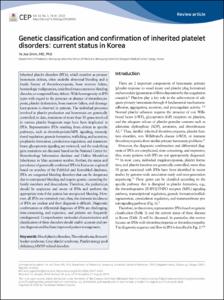Genetic classification and confirmation of inherited platelet disorders: current status in Korea
- Keimyung Author(s)
- Shim, Ye Jee
- Department
- Dept. of Pediatrics (소아청소년학)
- Journal Title
- Clinical and experimental pediatrics
- Issued Date
- 2020
- Volume
- 63
- Issue
- 3
- Keyword
- Blood platelet disorders; Thrombasthenia; Bernard-Soulier syndrome; Gray platelet syndrome; Platelet storage pool deficiency; MYH9-related disorders
- Abstract
- Inherited platelet disorders (IPDs), which manifest as primary hemostasis defects, often underlie abnormal bleeding and a family history of thrombocytopenia, bone marrow failure, hematologic malignancies, undefined mucocutaneous bleeding disorder, or congenital bony defects. Wide heterogeneity in IPD types with regard to the presence or absence of thrombocytopenia, platelet dysfunction, bone marrow failure, and dysmegakaryopoiesis is observed in patients. The individual processes involved in platelet production and hemostasis are genetically controlled; to date, mutations of more than 50 genes involved in various platelet biogenesis steps have been implicated in IPDs. Representative IPDs resulting from defects in specific pathways, such as thrombopoietin/MPL signaling; transcriptional regulation; granule formation, trafficking, and secretion; proplatelet formation; cytoskeleton regulation; and transmembrane glycoprotein signaling are reviewed, and the underlying gene mutations are discussed based on the National Center for Biotechnology Information database and Online Mendelian Inheritance in Man accession number. Further, the status and prevalence of genetically confirmed IPDs in Korea are explored based on searches of the PubMed and KoreaMed databases. IPDs are congenital bleeding disorders that can be dangerous due to unexpected bleeding and require genetic counseling for family members and descendants. Therefore, the pediatrician should be suspicious and aware of IPDs and perform the appropriate tests if the patient has unexpected bleeding. However, all IPDs are extremely rare; thus, the domestic incidences of IPDs are unclear and their diagnosis is difficult. Diagnostic confirmation or differential diagnoses of IPDs are challenging, time-consuming, and expensive, and patients are frequently misdiagnosed. Comprehensive molecular characterization and classification of these disorders should enable accurate and precise diagnosis and facilitate improved patient management.
- Keimyung Author(s)(Kor)
- 심예지
- Publisher
- School of Medicine (의과대학)
- Citation
- Ye Jee Shim. (2020). Genetic classification and confirmation of inherited platelet disorders: current status in Korea. Clinical and experimental pediatrics, 63(3), 79–87. doi: 10.3345/kjp.2019.00052
- Type
- Article
- ISSN
- 2713-4148
- Source
- https://www.e-cep.org/journal/view.php?doi=10.3345/kjp.2019.00052
- Appears in Collections:
- 1. School of Medicine (의과대학) > Dept. of Pediatrics (소아청소년학)
- 파일 목록
-
-
Download
 oak-2020-0259.pdf
기타 데이터 / 1.08 MB / Adobe PDF
oak-2020-0259.pdf
기타 데이터 / 1.08 MB / Adobe PDF
-
Items in Repository are protected by copyright, with all rights reserved, unless otherwise indicated.